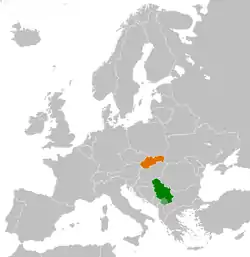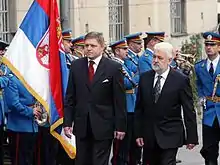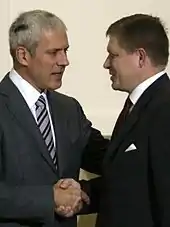Serbia–Slovakia relations
Serbian-Slovak relations are foreign relations between Serbia and Slovakia. Both countries established direct diplomatic relations in 1993. Serbia has an embassy in Bratislava. Slovakia has an embassy in Belgrade. Slovakia is among the few NATO and EU members which have not recognized the independence of Kosovo.[a] Also Serbia is an EU candidate and Slovakia is an EU member. Serbian-Slovak relations have historically been good and stable. Some Serbian scholars consider that out of all nations they encounted with, Serbs had the best relations with Slovaks throughout their history.
 | |
Serbia |
Slovakia |
|---|---|
History
Serbian-Slovak relations i.e. cooperation was especially good in the 18th and the 19th century, in the fields of culture, art, commerce, education, science, politics and military.[1]
During the course of two centuries, more than 2500 Serbs were educated in various universities and higher institutions of learning in Slovakia, mostly in Bratislava, Košice and Kežmarok.[1]
Noted Slovaks were active in the cultural and political life of Serbia, such as Pavel Jozef Šafárik, Ján Kollár and Ľudovít Štúr. Under the influence and drawing on the works of Serbian linguist Vuk Stefanović Karadžić, Pavel Jozef Šafárik and Jan Kolar decided to start collecting Slovak folk poems. During the 19th century, Serbs and Slovaks supported each other and were active in spreading the ideas based on Slavophilia.[1]
Serbian author and historian Risto Kovijanić researched Serbian-Slovak relations for over 50 years and published a number of works on the topic.[1]
Both nations were oppressed by foreign occupiers and Slovaks and Serbs recognised in each other friends and allies in the struggle for independence of their countries and autonomy of their language and Slavic culture.[1]
Historian and an expert on Serb-Slovak relations Nebojša Kuzmanović concludes that Serbs had the best relations with Slovaks out of any ethnic group throughout their history.[1]
Country comparison
| Population | 5,464,060 | 7,001,444 (excluding Kosovo) |
| Area | 49,035 km2 (18,933 sq mi) | 88,361 km2 (34,116 sq mi) (including Kosovo) 77,474 km2 (29,913 sq mi) (excluding Kosovo) |
| Population Density | 111/km2 (287.5 /sq mi) | 91,1/km2 (238 /sq mi) |
| Capital | Bratislava | Belgrade |
| Largest City | Bratislava - 437,726 (659,598 Metro) | Belgrade - 1,233,796 (1,683,962 Metro) |
| Government | Parliamentary republic | Parliamentary republic |
| Current leader | President Zuzana Čaputová Prime Minister Igor Matovič |
President Aleksandar Vučić Prime Minister Ana Brnabić |
| Official languages | Slovakian | Serbian |
| Main religions | 75.9% Christianity, 13.4% No religion, 10.6% Unanswered | 84.59% Eastern Orthodoxy, 4.97% Catholicism, 3.10% Islam, 0.99% Protestantism, 1.11% No religion, 5.24% others (excluding Kosovo) |
| Ethnic groups | 80.7% Slovaks, 8.5% Hungarians, 2.0% Roma and 8.8% others and unspecified |
83.3% Serbs, 3.5% Hungarians, 2.1% Roma, 2% Bosniaks, 9% other groups (excluding Kosovo) |
| GDP (nominal) | $111.874 billion ($20,495 per capita) | $52 billion ($7,497 per capita) (excluding Kosovo) |
Gallery
 Prime ministers Robert Fico with Mirko Cvetković
Prime ministers Robert Fico with Mirko Cvetković Robert Fico meeting with Serbian President Boris Tadić.
Robert Fico meeting with Serbian President Boris Tadić.
See also
Notes
| a. | ^ Kosovo is the subject of a territorial dispute between the Republic of Kosovo and the Republic of Serbia. The Republic of Kosovo unilaterally declared independence on 17 February 2008. Serbia continues to claim it as part of its own sovereign territory. The two governments began to normalise relations in 2013, as part of the 2013 Brussels Agreement. Kosovo is currently recognized as an independent state by 98 out of the 193 United Nations member states. In total, 113 UN member states recognized Kosovo at some point, of which 15 later withdrew their recognition. |
References
- Kuzmanović, Nebojša (2004). "Susretanje kultura, pledoaje za izučavanje srpsko - slovačkih književnih veza". Sunčanik. Bačka Palanka.
